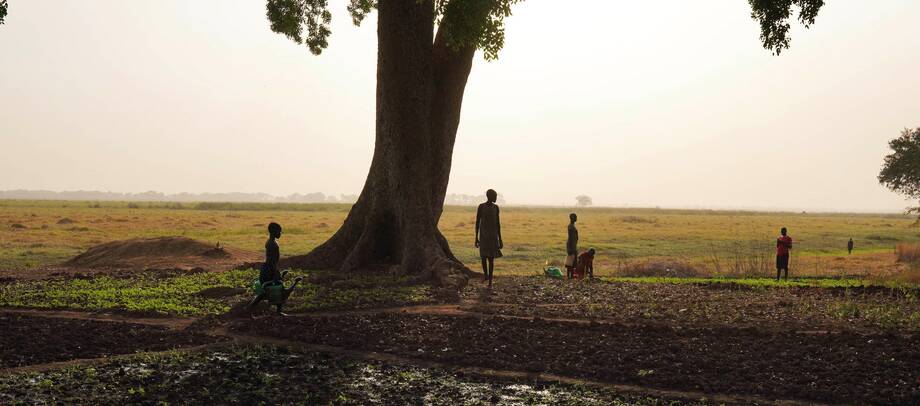A thriving agriculture sector is crucial to long-term peace and development in South Sudan. Up to 95 percent of the country's population depends on farming, fishing or herding to meet their food and income needs. Yet, South Sudan faces one of the world's worst humanitarian and food security situations.
More than 2.3 million people have been displaced by violence in South Sudan since mid-December 2013, including around 645 000 people who are sheltering in neighboring countries. Continued violence, a deteriorating economy and climatic shocks indicate the deepening impact of the crisis.
Around a third of South Sudanese are now food insecure, and the latest Integrated Food Security Phase Classification (IPC) analysis carried out in September 2015 indicates that food security has deteriorated at an alarming rate since the outbreak of the conflict. About 3.9 million people are now facing crisis or emergency levels of food insecurity and the outlook for 2016 is dire. Of particular concern are the 40 000 people in Unity State who are experiencing a Catastrophe, which could to deteriorate to famine without immediate humanitarian access and assistance.
Despite continued constraints to humanitarian access, FAO is acting to meet the two-fold challenge of responding to urgent needs triggered by the current crisis, while continuing vital livelihood protection and support programmes in less-affected states. Through a mixture of immediate assistance to the most vulnerable communities and longer-term support to build the capacity of local, state and national government institutions, FAO is helping to strengthen food security and build sustainable, agriculture-based livelihoods in South Sudan.
Protecting livestock health, herders' futures
Livestock, particularly cattle, goats and sheep, are an important social and economic asset in South Sudan. However, endemic diseases (like haemorrhagic septicaemia, contagious bovine pleuropneumonia, anthrax and peste des petits ruminants) are undermining livestock production, threatening the livelihoods of 65 percent of South Sudan's population. The current conflict has caused abnormal migration, heightening tensions between herders and settled farmers and increasing instances of disease outbreak. Local and national capacity to monitor, control and respond to these diseases is severely limited; to address this, FAO works closely with the relevant ministries and local institutions to ensure a reliable and stable supply of veterinary drugs, vaccines and equipment to safeguard livestock production. The national cold chain system is being supported with equipment, regular maintenance and training for staff in order to protect these drugs and vaccines, and local community-based animal health workers are provided refresher training on necessary veterinary services.
Improved yields through improved seeds
Levels of crop and vegetable production in South Sudan remain low. As is the case in much of eastern Africa, farmers rely heavily on rainfed crop production meaning erratic or delayed rains can result in poor or no harvests, while heavy rains and flooding can waterlog fields and destroy stocks. Conflict and mass displacement continue to force farmers from their fields during key times in the planting season. FAO has been working with South Sudan's farmers to strengthen crop production in spite of these challenges.
A lack of availability and access to quality seeds and planting materials constrain yields. Most farmers in South Sudan use seeds saved from a previous season or acquired through their social networks - from friends and families. FAO works on two fronts to increase the availability of quality inputs.
The most vulnerable farmers (particularly those in conflict-affected areas and households headed by women) are provided, through seed fairs or direct distribution, with quality seeds and tools, along with training in good agronomic practices. Especially in areas less affected by the ongoing crisis, FAO supports resilience-building through farmer field schools in South Sudan. Seed multiplication is also promoted in these areas, where selected farmers are provided with quality seeds and trained in production, conditioning, storage and marketing. Quality assessment councils are set up at the local level to ensure the seeds produced are of good quality.
Support to food security information and analysis
Crop and livestock activities are extremely sensitive to climate and weather conditions, which in turn affect national food security as over 90 percent of production depends on rainfall. Early warning is key to equipping farming communities and policy-makers with the knowledge they need to improve production, as well as food security programming, across South Sudan.
Accurate and timely food security information and analysis is crucial to inform decision-making. In South Sudan, FAO is strengthening national capacity for food security data collection, analysis and coordination through support to the IPC, resilience analysis, livestock conflict analysis, crop assessments and market monitoring. Food security monitoring teams from FAO and partners regularly gather essential data related to livelihoods; access to and availability of food; consumption and nutrition. Analysed and disseminated widely, the data are critical in providing an accurate picture of the evolving food security and livelihood situation - helping to focus assistance in communities that need it most.
Local food production is increasingly important as markets have been severely disrupted by economic shocks and insecurity. Advance knowledge and close monitoring of weather conditions is vital in guiding agricultural planning and operations - critical to inform timely livelihood support and resilience programming, as well as food assistance targeting. FAO is supporting relevant government institutions to enhance the collection, analysis and reporting of agrometeorological information in order to produce a stream of data such as precipitation, temperature and wind speed.
FAO has been systematically identifying and categorizing existing meteorological equipment in South Sudan; rehabilitating existing equipment; installing new rain gauge equipment; and training local government focal persons in data collection and equipment maintenance.


